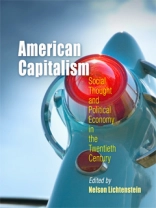At the dawn of the twenty-first century, the legitimacy of American capitalism seems unchallenged. The link between open markets, economic growth, and democratic success has become common wisdom, not only among policy makers but for many intellectuals as well. In this instance, however, the past has hardly been prologue to contemporary confidence in the free market. American Capitalism presents thirteen thought-provoking essays that explain how a variety of individuals, many prominent intellectuals but others partisans in the combative world of business and policy, engaged with anxieties about the seismic economic changes in postwar America and, in the process, reconfigured the early twentieth-century ideology that put critique of economic power and privilege at its center.
The essays consider a broad spectrum of figures—from C. L. R. James and John Kenneth Galbraith to Peter Drucker and Ayn Rand—and topics ranging from theories of Cold War ‘convergence’ to the rise of the philanthropic Right. They examine how the shift away from political economy at midcentury paved the way for the 1960s and the ‘culture wars’ that followed. Contributors interrogate what was lost and gained when intellectuals moved their focus from political economy to cultural criticism. The volume thereby offers a blueprint for a dramatic reevaluation of how we should think about the trajectory of American intellectual history in twentieth-century United States.
Содержание
Introduction: Social Theory and Capitalist Reality in the American Century
PART I. THEORIZING TWENTIETH-CENTURY AMERICAN CAPITALISM
1 The Postcapitalist Vision in Twentieth-Century American Social Thought
—Howard Brick
2 To Moscow and Back: American Social Scientists and the Concept of Convergence
—David C. Engerman
PART II. LIBERALISM AND ITS SOCIAL AGENDA
3 Clark Kerr: From the Industrial to the Knowledge Economy
—Paddy Riley
4 John Kenneth Galbraith: Liberalism and the Politics of Cultural Critique
—Kevin Mattson
5 The Prophet of Post-Fordism: Peter Drucker and the Legitimation of the Corporation
—Nils Gilman
PART III. A CRITIQUE FROM THE LEFT
6 C. Wright Mills and American Social Science
—Daniel Geary
7 C. L. R. James and the Theory of State Capitalism
—Christopher Phelps
8 Oliver C. Cox and the Roots of World Systems Theory
—Christopher A. Mc Auley
9 Feminism, Women’s History, and American Social Thought at Midcentury
—Daniel Horowitz
PART IV. THE RISE OF THE RIGHT
10 The Road Less Traveled: Reconsidering the Political Writings of Friedrich von Hayek
—Juliet Williams
11 The Politics of Rich and Rich: Postwar Investigations of Foundations and the Rise of the Philanthropic Right
—Alice O’Connor
12 American Counterrevolutionary: Lemuel Ricketts Boulware and General Electric, 1950-1960
—Kimberly Phillips-Fein
13 Godless Capitalism: Ayn Rand and the Conservative Movement
—Jennifer Burns
Notes
Contributors
Index
Acknowledgments
Об авторе
Nelson Lichtenstein is Professor of History at the University of California, Santa Barbara, where he directs the Center for Work, Labor, and Democracy. He is the author of Walter Reuther: The Most Dangerous Man in Detroit and State of the Union: A Century of American Labor, and editor of Wal-Mart: The Face of Twenty-First-Century Capitalism.












